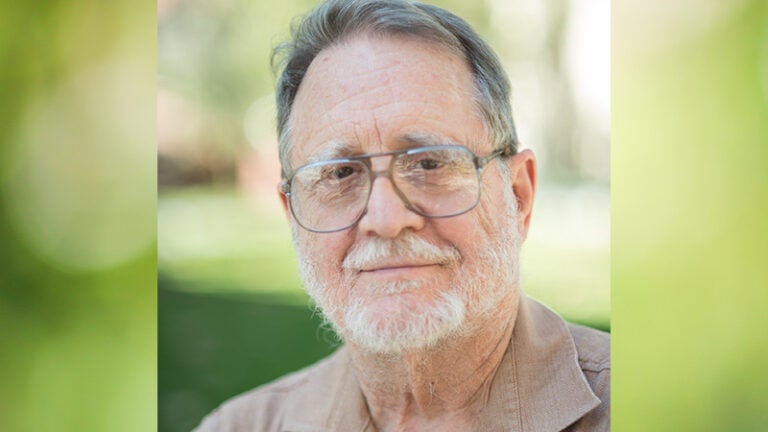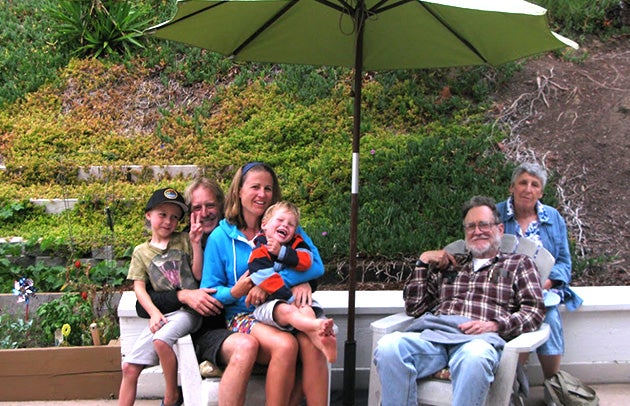
Globe-trotting physicist Richard Thompson studied foundational aspects and uses of superconductivity
After earning his PhD at Harvard in 1966, physicist Richard “Dick” Thompson spent several years working at research labs in the Soviet Union and France. Perhaps it was this experience and later work in Germany that gave him a special affinity for the international students who passed through the halls of the USC Dornsife College of Letters, Arts and Sciences, particularly those he oversaw as director of the graduate program in the Department of Physics and Astronomy.
Thompson, Associate Professor Emeritus of Physics and Astronomy, joined USC Dornsife in 1970 and would go on to be a beloved mentor, colleague and scientist in the ensuing five decades before his death this year on Oct. 7 at age 83.
“Dick was thoughtful and sincere, bringing in a lot of compassion and warmth, especially towards graduate students from abroad who had to undergo hardships to get here,” says Stephan Haas, department chair and professor of physics and astronomy at USC Dornsife. “I remember him personally picking up students from the airport and hosting them at his home until they found their own place to stay.”
Thompson, who retired in 2016, specialized in research on superconductors, materials that show no electrical resistance when cooled to extremely low temperatures. Thompson focused on changes in electrical conductivity that occurred as a result of fluctuations in temperature. This work led to his most known contribution to the field — the Maki-Thompson effect. Named after Thompson and his fellow USC Dornsife physics professor Kazumi Maki, who died in 2008, the effect arises from important fluctuations in electron transport that occur in superconductors when they are close to their critical transition temperature (the temperature at which their resistance to electrical currents drops to zero).
“Dick was widely recognized as an exceptionally smart and knowledgeable physicist. He was the person to go to if you needed an explanation or clarification of some thorny question,” says Robin Shakeshaft, professor of physics and astronomy. “I am most grateful for the help he gave me to understand some difficult topics in electromagnetism when I first began teaching that subject, and for his kindness in giving me the problems and solutions that he had worked out when he had taught that topic.”
Finding love, thanks in part to the KGB
Thompson’s son, Andrew, describes his father as having had a “colorful” life.
Thompson was born in Hobbs, New Mexico – “an oil boom town in the middle of nowhere,” Andrew says, adding that Thompson’s father ran a furniture store that was lucrative because he also sold dynamite and other explosives to oil prospectors.
Thompson was an excellent student and earned a full scholarship to Caltech, from which he graduated in 1961. From there, he went to Harvard University, earning his master’s degree in 1962 and then his doctorate.
He then landed appointments at laboratories in Saclay, France, and Moscow. Andrew says his father, who had long been interested in Russian culture, was eager to be part of an exchange program for physicists between the United States and the USSR. It was in Moscow that, in 1966, Thompson met his future wife, Nina. She was teaching English at the time and wanted to leave the Soviet Union, and the pair married after a short courtship, Andrew says. Nina died in 2021.
Andrew remarks that his mother’s mother was opposed to the wedding, but the KGB handlers for his father – every American physicist had one, he says – were interested in having as many private channels as they could to the U.S. scientists.
“So, the KGB had a little talk with my grandmother, and they explained to her why this wedding was going to happen, and how she better shut up and not make any problems.” Though she refused to attend the wedding, Andrew’s grandmother dropped her opposition to it.
A determined father

Andrew says that he grew up in awe of his father’s sense of determination and dedication as he raised Andrew’s younger brother, and Thompson’s only other child, Paul. Born in the mid-1970s, Paul contracted meningitis as a baby, which left him permanently deaf.
“At that time, there was very little information for hearing people to navigate raising a deaf baby,” Andrew says. “My parents had to teach themselves sign language and advocate for my brother in schools to make sure he was receiving the education he needed. And they had to figure out themselves how to do all that. My brother has thrived, and that is a direct result of the heroic efforts my parents made.”
Andrew attended USC, earning a Bachelor of Science degree in biological sciences from USC Dornsife in 1993.
Although Andrew didn’t take any of his dad’s classes at USC, he knew a few people who did, including his first-year roommate. By all reports, his father ran a classroom that allowed no room for slacking off.
“There was a guy I knew who would tell me that he had recurring nightmares about my dad’s homework problems, particularly one related to the forces at work on a gold cube inside of a vacuum,” Andrew says.
In addition to his sons, Andrew and Paul, Thompson is survived by his grandchildren, Colin and Connor, and his sister, Marge.